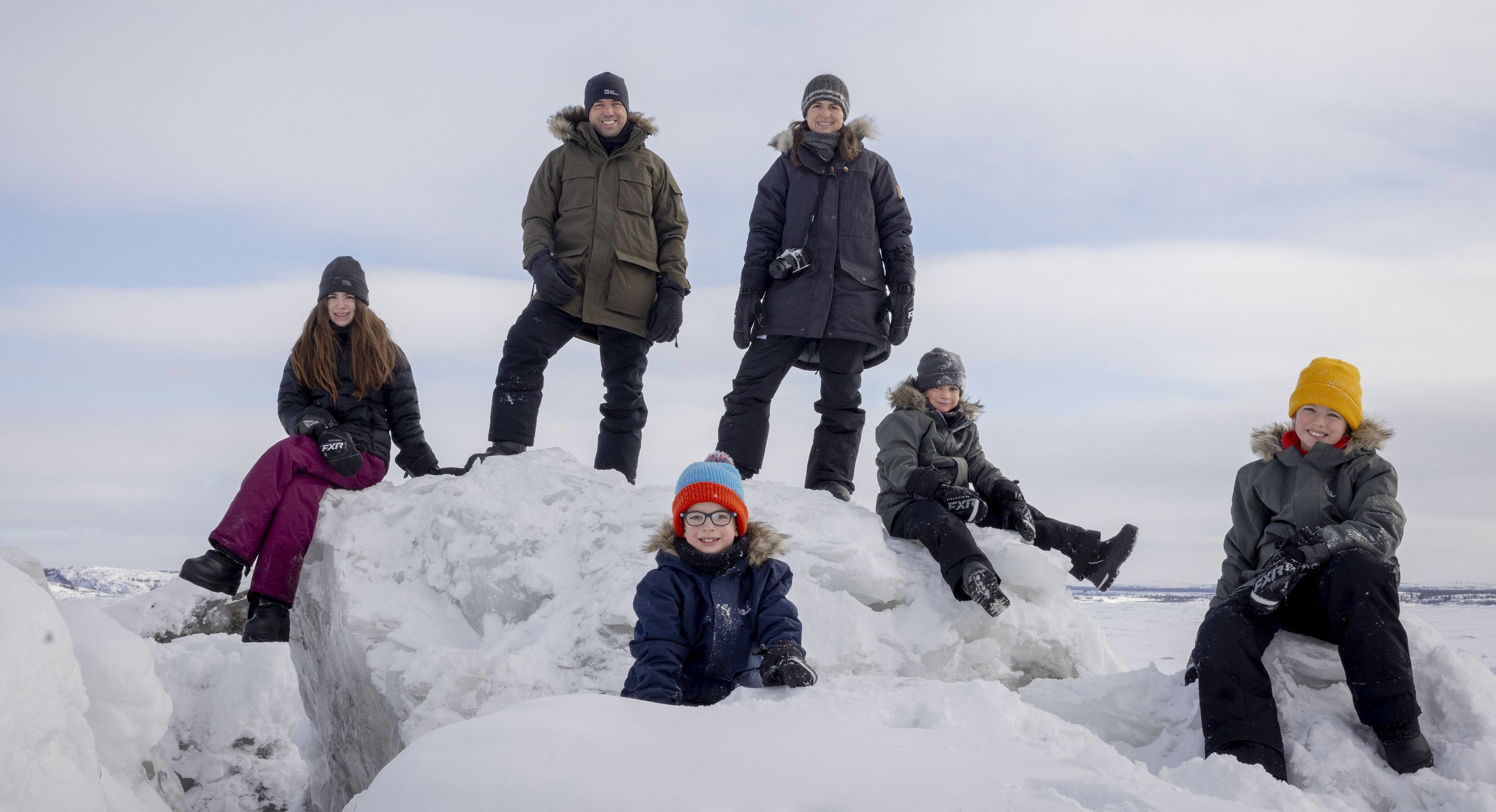Nat Geo's 'Blink' tracks a family finding beauty while facing blindness as they travel the globe
“Let's go all in and fill their visual memory with as much beauty as we can."

Mia, Leo, Colin, and Laurent Pelletier pose on top of their camper van in front of adouble rainbow while in Mongolia.
“Blink,” a new film by National Geographic Documentary Films shows how a family with four children, three of whom are going blind, embraces life in the face of an uncertain future. It’s a testament to the resilience of the Lemay-Pelletier family but also a reminder for all of us to seize the day because all our futures are uncertain.
Edith Lemay and Sébastien Pelletier are the parents of Mia, a 13-year-old girl, and three boys: Léo, 11, Colin, 9, and Laurent, 7. Over the last six years, they’ve learned that Mia and the two youngest boys have retinitis pigmentosa, a rare genetic disease in which the cells of the retina slowly die. As the disease progresses, the person develops “tunnel vision” that shrinks until very little vision remains.
The diagnosis devastated the parents. "The hardest part with the diagnosis was inaction. There's nothing they can do about it. There's no treatment,” Edith says in the film.
However, even though the parents couldn’t affect the progress of the disease, they could give their children’s senses an epic experience that would benefit them for a lifetime.
“We don’t know how fast it’s going to go, but we expect them to be completely blind by mid-life,” said the parents. Mia’s impairment advisor suggested they fill her visual memory with pictures from books. “I thought, I’m not going to show her an elephant in a book; I’m going to take her to see a real elephant,” Edith explains in the film. “And I’m going to fill her visual memory with the best, most beautiful images I can.”

This realization led to an inspiring year-long journey across 24 countries, during which every family member experienced something on their bucket list. Mia swam with dolphins, Edith rode a hot-air balloon in Cappadocia, and Léo saw elephants on safari.
Colin realized his dream of sleeping on a moving train while Sébastien saw the historic site of Angkor Wat.
“We were focusing on sights,” explains Pelletier. “We were also focusing a lot on fauna and flora. We’ve seen incredible animals in Africa but also elsewhere. So we were really trying to make them see things that they wouldn’t have seen at home and have the most incredible experiences.”
Cameras followed the family for 76 days as they traveled to far-flung locales, including Namibia, Mongolia, Egypt, Laos, Nepal and Turkey. Along the way, the family made friends with local people and wildlife. In a heartbreaking scene, the boys wept as the family had to leave behind a dog named Bella he befriended in the mountains of Nepal.
But the film isn't just about the wonders of nature and family camaraderie. The family's trip becomes a “nightmare” when they are trapped in a cable car suspended hundreds of feet above the Ecuadorian forest for over 10 hours.

As expected, NatGeo’s cinematographers beautifully capture the family's journey, and in the case of “Blink,” this majestic vision is of even greater importance. In some of the film's quietest moments, we see the children taking in the world's wonders, from the vast White Desert in Egypt to a fearless butterfly in Nepal, with the full knowledge that their sight will fail one day.
Along the way, the family took as many pictures as possible to reinforce the memories they made on their adventure. “Maybe they’ll be able to look at the photographs and the pictures and they will bring back those stories, those memories, of the family together,” Edith says.
But the film is about more than travel adventures and the pain of grief; ultimately, it’s about family.
“By balancing [the parents’ grief] with a more innocent and joyous tale of childlike wonder and discovery, we felt we could go beyond a mere catalog of locations and capture something universal,” the directors Edmund Stenson and Daniel Roher, said in a statement. “Keeping our camera at kid-height and intimately close to the family, we aimed to immerse the audience in the observational realities of their daily life, as well as the subtle relationships between each of them. This is a film built on looks, gestures and tiny details—the very fabric of our relationships with one another.”
Ultimately, “Blink” is a great film to see with your loved ones because it’s a beautiful reminder to appreciate the wonders of our world, the gift of our senses and the beauty of family.
The film will open in over 150 theaters in the U.S. and Canada beginning Oct. 4 and will debut on National Geographic Channel and stream on Disney+ and Hulu later this year. Visit the “Blink” website for more information.
- Here's the first ever footage of a baby sperm whale nursing from its mother ›
- 10 of our absolute favorite photos from National Geographic’s Pictures of the Year 2022 issue ›
- Four big takeaways from National Geographic's new 'Fauci' documentary ›
- 7 of the best Nat Geo photos of 2024 - Upworthy ›
- Upworthy celebrate Subaru with 5 things that made us smile this week 12/6/24 - Upworthy ›
- I've dealt with face blindness my whole life but these five tips from real people are game changers - Upworthy ›

